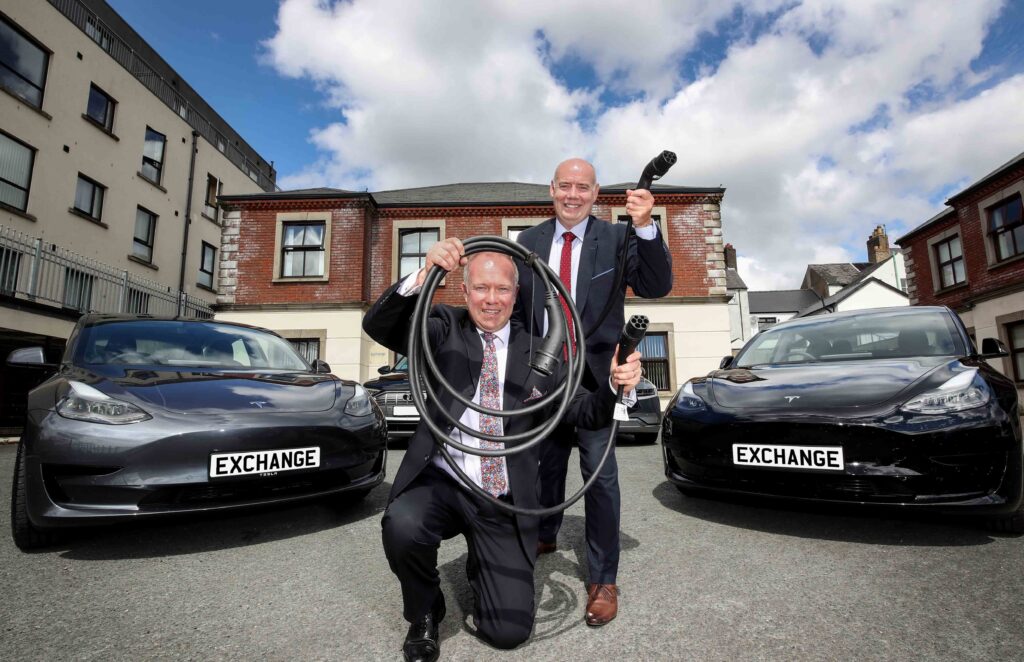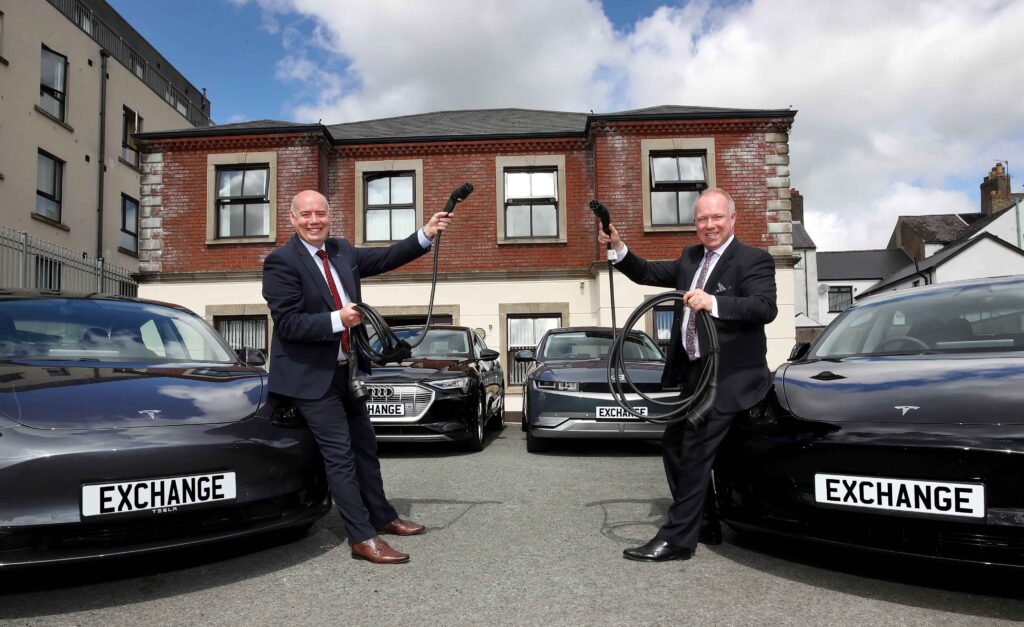
As part of its ‘Ten Point Plan for a Green Industrial Revolution’, the UK Government has pledged to end the sale of new petrol and diesel cars by 2030 in a bid to reduce carbon emissions on our roads.
Already, an ever-increasing number of electric vehicles (EVs) can now be seen on Northern Ireland’s roads, and experts at Lisburn-based digital accountancy specialist Exchange Accountants expect this to increase significantly due to the rising cost of traditional fuels such as diesel and petrol, and, importantly, the tax benefits on offer to the business community.
“From a tax perspective, we’ve been advising our clients to switch to an EV for some time now,” said Exchange Accountants Director Conor Walls, “but with global events driving traditional fuel costs up massively, it’s now become what we call in the business, a ‘no brainer’!
“Company car drivers will save thousands of pounds from a vastly reduced ‘benefit in kind’ charge to encourage motorists to go electric and reduce carbon emissions on our roads.
“Not only that, there is an increasing number of free EV charging points across Northern Ireland, and home or office units will charge your car at a fraction of the cost of fuel, which could now cost as much as £100 for a full tank of diesel or petrol.
“Charging your EV does take a lot longer than stopping at the pumps,” continued Conor, “but if you can make some lifestyle changes and plan your journeys to take this into account, then there are hundreds, even thousands of pounds to be saved on fuel – on top of any tax savings you may make.”
There are currently more than 100 models of EV in the UK market and by 2025, the Government expects that there will be almost as many as with conventional petrol and diesel vehicles.
From 2030, all vehicles will be required to have a significant zero emissions capability (e.g., plug-in and full hybrids) and to be 100% zero emissions from 2035.
To accelerate the transition and encourage employers and employees to make green choices, the Government has pledged to offer tax incentives to both, and to significantly improve the EV infrastructure with more charging units installed across Northern Ireland and the rest of the UK.
Exchange Accountants has put together a few reasons why business owners should consider plugging in to the benefits on offer.
Company cars
If you provide your employee with a company car or company van that is available for the employee’s private use, the employee is taxed on the resulting ‘benefit in kind’ – with the amount of tax paid depending mainly on the list price of the vehicle and the level of its CO2 emissions.
So to encourage drivers to adopt low-emission cars, drivers of electric and low emission cars pay less tax than those choosing higher emission models, while drivers of diesel cars not meeting the RDE2 emissions standard will pay an additional supplement.

For 2022/23, the amount that is charged to tax in respect of an electric company car is just 2% of the list price of the car (compared to up to 37% for conventional fuel vehicles) and optional accessories, as reduced by capital contributions of up to £5,000. The taxable amount is adjusted to reflect certain periods of unavailability and any contributions for private use. This low charge means that an electric company car is a very tax-efficient benefit.
To put this into context, a typical fuel-driven company car will consume not just diesel or petrol, but a significant portion, if not all, of a company car driver’s tax-free allowance. However, the taxable amount for an electric car with a list price of £30,000 would be only £600 for 2022/23 which still leaves most of their tax-free allowance intact. Consequently, a basic rate taxpayer would only pay £120 in tax for the benefit of having an electric company car available for their private use throughout 2022/23. For a higher rate taxpayer, the tax hit is only £240.
As an employer, you pay Class 1A National Insurance contributions on the total taxable benefits provided to employees. For 2022/23, these are payable at the rate of 15.05%. So, the lower the benefit in kind tax charge for employees, the lower your associated Class 1A National Insurance bill.
Capital Allowances
Fully electric company cars qualify for a 100% first-year capital allowance so long as the vehicle is new and unused. Therefore, if your company invests in a qualifying electric vehicle, it could save corporation tax of 19% on the cost of the vehicle. For example, if a company purchases a new and unused fully electric vehicle costing £40,000, this could equate to a corporation tax saving of £7,600.
Car fuel benefit charges
HMRC does not regard electricity as a ‘fuel’ for the purposes of the fuel benefit charge. Consequently, if you provide or meet the cost of electricity for an employee’s private mileage in an electric company car, the employee will not be taxed on that provision, and there is no Class 1A for you to pay.
If an employee with a company car meets the cost of electricity for business journeys, you can make a mileage payment tax-free as long as the amount paid is not more than the advisory fuel rate at that time. Currently, a payment of 5 pence per mile can be made tax-free. Compare this to company car drivers of hybrid or petrol/diesel fuelled vehicles who could be paying a significant, additional tax charge if their employer meets private fuel costs.
Workplace charging
A tax exemption applies if you provide electric charging facilities at or near the workplace which can be used by employees generally to charge their cars. The exemption applies when the charging facilities are used by an employee to charge their own car or a car in which they are a passenger (for example, a car used to give an employee a lift to work). The exemption is not relevant to company cars – charging costs are a connected cost of providing the car and are subject to a separate exemption. Nor does it apply if you reimburse an employee for the cost of charging their vehicle away from the workplace.
Government grants are available to help businesses install electric vehicle (EV) chargepoints for staff on their premises. The Office for Zero Emission Vehicles (OZEV) is offering businesses up to £350 towards the cost of buying and installing each chargepoint socket provided. Charging infrastructure grants of up to £500 are also available if needed for each parking space to which the charging infrastructure will provide a unique chargepoint socket. More details on this grant scheme are available on www.gov.uk/guidance/workplace-charging-scheme-guidance-for-applicants.
Company vans
A tax charge arises under the benefit-in-kind rules if a company van is available to an employee for their unrestricted private use. No charge arises if private use is restricted to ‘home to work’ travel. However, there is no tax charge if an employee has unrestricted private use of an electric company van. By contrast, the amount charged to tax for 2022/23 for a van other than an electric van is £3,600.
Choosing an electric company van will save an employee paying tax at the basic rate £720 in tax and an employee paying tax at the higher rate £1,440 in tax. Employers will also save Class 1A National Insurance of £541.80.
As with company cars, electricity is not regarded as a ‘fuel’ for the purposes of the fuel scale charge. Consequently, if you meet the cost of electricity for unrestricted private mileage in a company van, there is no associated fuel benefit charge.
“As the infrastructure for recharging electric vehicles is expanded, and with our aims to meet climate change obligations, the tax incentives set out above are the icing on the cake,” said Exchange Accountants director Conor Walls.
“If you are considering your options and need advice on the tax benefits available, our team at Exchange Accountants would be more than happy to help you formulate a tax-efficient company vehicle policy and explain the tax implications of your vehicle choices.”
To download a free eBook on the benefits of electric vehicles for businesses, click on https://exchangeaccountants.com/ev-guide/.
Established in 2011, Exchange Accountants provides premier accountancy services and tax advice to a wide variety of locally based SMEs and individuals.
Based in Lisburn, Exchange was the first accountancy practice in Northern Ireland to be recognized as a Xero Gold Partner – and last year, the company achieved Platinum Partner status with the market-leading cloud accountancy software provider.
For more information on Exchange’s digital accountancy services, call 028 9263 4135, send an email to info@exchangeaccountants.com or click on www.exchangeaccountants.com.



